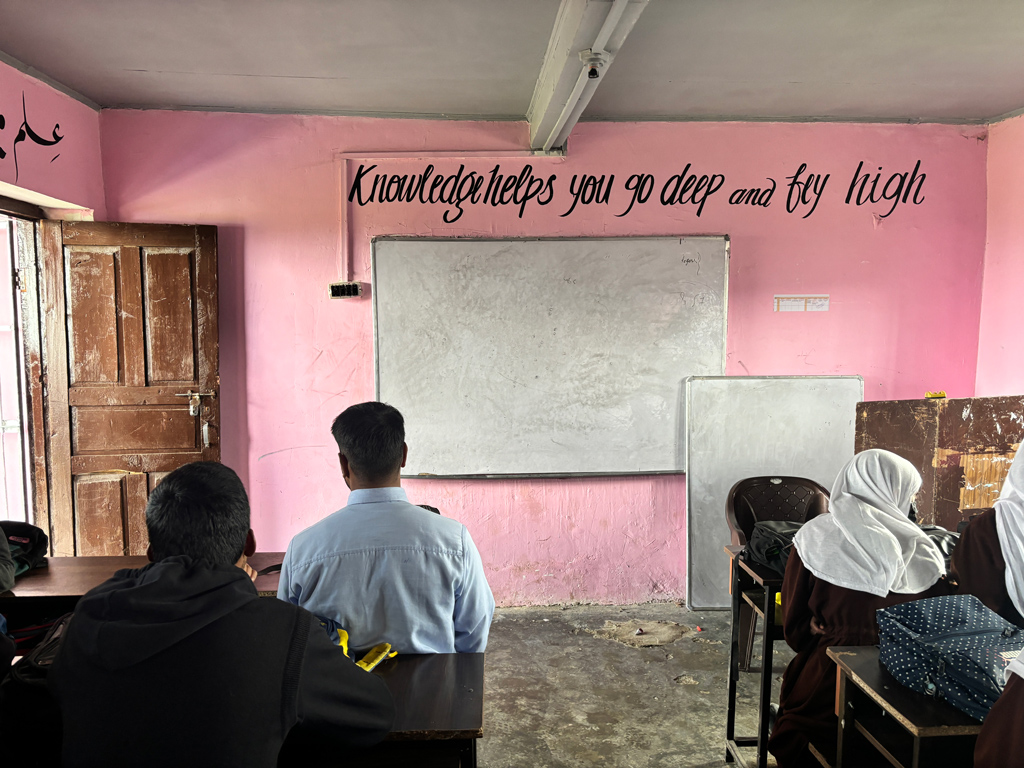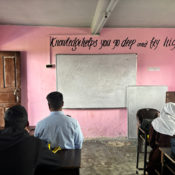
The boy who cooks, then dreams
Every morning before the school bell rings at a local higher secondary school, Baramulla,
16-year-old Kashif Hussain (Name Changed) wakes up in the grey light of dawn, not to pack a
bag or revise homework but to cook breakfast for his family. His mother, who has an untreated
intellectual disability, lives with him and is frequently disoriented and sometimes violent. His
father, a day labourer with hard hands and a worn face, goes out for menial jobs before dawn,
and returns to a small house filled with quiet, anxiety, and aspirations placed upon the slender
shoulders of a boy.
Until recently, those aspirations were fading. “I couldn’t study at all,” Kashif murmurs softly,
sitting cross-legged on a wooden mat in the one room he shares with his parents. “No one was
there to assist me. I had to cook, clean, and just remain silent when Ami would scream.” But all
of that changed when a group of strangers entered our village.
Tucked among the rolling fields of Baramulla district, his village is one of the lesser-known
corners of the complicated topography of Kashmir where children mature too quickly and
dreams quietly wither away. Yet over the past few years, this small village has been a quiet
observer to something unprecedented: the arrival of hope.
Hope came in the form of a group from Human Welfare Voluntary Organisation (HWVO), an
organisation working unobtrusively in Kashmir to raise children at risk of being pushed out of
school, swept into child labour, or slipping out of view. “We sit down first with the villagers –
the Sarpanch, the Moulvi Sahab, Bait-ul-Maal committee members, Auqaaf committee members,
or whoever knows the area,” says HWVO District Coordinator Sabahat. “Then we start finding
children – who they are, how they live, and what they require.”
After a discussion of Kashif took place at a community meeting, the team walked through muddy
lanes to reach the family. What they uncovered was a home struggling on emotional, financial,
and social terms. “His mother’s situation has hurt Kashif deeply. She sometimes gets angry and
that frightens him,” Sabahat says. “He is emotionally vulnerable, despite his efforts to show
himself tough. The two sisters are married now, but they are constantly anxious about what’s
going on at home. And the father… he’s just worn out.
Through HWVO’s case management programme, Kashif was added to their support system.
Counsellors started making regular home visits. Neighbours were quietly encouraged to provide
assistance. And most importantly, donors – individuals who will likely never step foot in this
village were compelled to give. Their donations assisted with school materials, some apparel,
and a bit of respite from the constant fear of how the next day’s meal would be obtained.
“It’s not much,” says Sabahat. “But it’s enough to keep the child in school.” And for Kashif, that
little has made all the difference. “Now I can study properly,” he smiles half-heartedly. “I want to
become an officer one day. I want to end our family’s problems.”
Thick on the ground across Kashmir are children like Kashif who sit poised on the brink of
dropout, not because they are less able but because they are less supported. It usually comes
down to a warm winter jacket, a pair of shoes, or the price of a few hundred rupees for notebooks
and bus tickets. “These are not children seeking luxury,” says Sabahat. “They are just seeking an
opportunity.”
In a world where the global focus is too easily drawn to the politics and security headlines,
stories such as Kashif often do not get told. But they are no less pressing. Behind each child like
him is a hidden crisis and in front of them perhaps an amazing future.
As the sun sets behind the hills and the village readies for another evening, Kashif takes out his
science book, studying charts of cells and ecosystems. His father hasn’t returned. His mother
mutters to herself in the corner. But for the first time in what feels like ages, Kashif doesn’t feel
invisible. “I just need some guidance,” he says. “And then I can guide others too.”
HWVO is looking for donors – everyday individuals inspired by extraordinary strength. Every
rupee, every contribution, is a stepping stone on a child’s journey towards stability and dignity.
“There are so many Kashifs,” says Sabahat. “We just hope people don’t forget them.”


